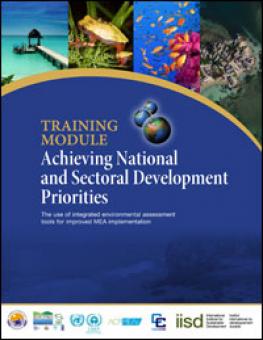
Training Module - Achieving National and Sectoral Development Priorities: The use of integrated environmental assessment tools for improved MEA implementation
This training module presents integrated environmental assessment (IEA) tools that can generate win-win scenarios for achieving national development priorities in the Caribbean through more effective multilateral environmental agreement (MEA) implementation.
Experts across the Caribbean had the following to say with regard challenges in national-level MEA implementation:
"We need to highlight what the national benefit is of the MEAs. The minister needs to see how and why it is good for the country."
"What is the national development plan and how does the MEA fit into this. We need to show that the MEA fits into the plan and is not additional work."
"The tendency is not to take on a specific MEA and due to a perception that it belongs to a single Ministry and not relevant to others."
The training module and workshop addresses these challenges through a series of six hands-on working sessions, each representing a critical step in clarifying future desired outcomes for MEA implementation (illustrated in the figure below). Each session features a specific IEA tool that helps to more cogently demonstrate the relevance of the MEA to national and sectoral development priorities and the important synergies among MEAs. The sessions and featured tools are highlighted below:
- Clarify Focal MEAs, Status and Linkages with Development Priorities — This session features an MEA Priorities Mapping Tool designed to help demonstrate the relevance of an MEA to national development priorities by identifying the ecosystem services supported by the MEA and exploring how these services each advance human well-being.
- Identify Synergies Among Focal MEAs — This session features an MEA Synergies Mapping Tool designed to help illustrate the commonalities among the various MEAs that have been ratified by a country, and thus increase the efficiency of implementation efforts. This tool utilizes the Driving Forces-Pressure-State-Impact-Response (DPSIR) analysis framework to obtain a better systems and comprehensive view of an MEA.
- Articulate Desired Future Outcomes — This session uses insights gleaned from the first two sessions to provide guidance for identifying key progress indicators and targets related to future MEA outcomes. It sets an MEA Challenge Scenario for the future, recognizing the synergies among MEAs and their relevance to national development priorities.
- Identify Portfolio of MEA Policies for Achieving Future Outcomes — This session features a Policy Mapping Tool that uses the DPSIR analysis framework to inventory the key policies in support of a specific MEA, identify major gaps, and make recommendations for achieving the desired future MEA outcomes.
- Assess Risks and Opportunities and Improve and Adapt as Necessary — This session features a Policy Stress Testing Tool to help identify the MEA implementation risks and opportunities under different plausible future scenarios.
- Prepare MEA Policy Planning Brief — This session helps workshop participants compile all of their results from the workshop into an MEA Policy Brief designed to help politicians and policy-makers understand (with supporting evidence) the importance of successful MEA implementation for advancing national development priorities.
Specific MEAs of focus for illustration of the use of integrated environmental assessment tools during the workshop will include the Cartagena Protocol on Biosafety, the Protocol Concerning Specially Protected Areas and Wildlife in the Wider Caribbean, the Protocol Concerning Pollution from Land-Based Sources and Activities, and the Convention on Biological Diversity.
The workshop and module development is funded by the Caribbean Community (CARICOM) and European Union, the United Nations Environment Programme (UNEP) - Regional Office for Latin America and the Caribbean, and UNEP's Global Environment Facility's Integrating Watershed and Coastal Areas Management (GEF-IWCAM) Project. Workshop and module design was led and coordinated by the International Institute for Sustainable Development (IISD).
You might also be interested in
The State of Global Environmental Governance 2023
In global environmental talks in 2023, the focus across nearly all issue areas was funding implementation and reviewing performance.
National State of the Environment Report: Uzbekistan
The National State of the Environment Report (NSoER) is a comprehensive document that provides a snapshot of current environmental trends in Uzbekistan's socio-economic development for citizens, experts, and policy-makers in the country of Uzbekistan.
Four Key Elements to Ensure a Successful Global Goal on Adaptation
As the final rounds of negotiations on the GGA kick off at COP 28, a looming question remains: Will it be comprehensive enough for countries to implement in the years ahead?